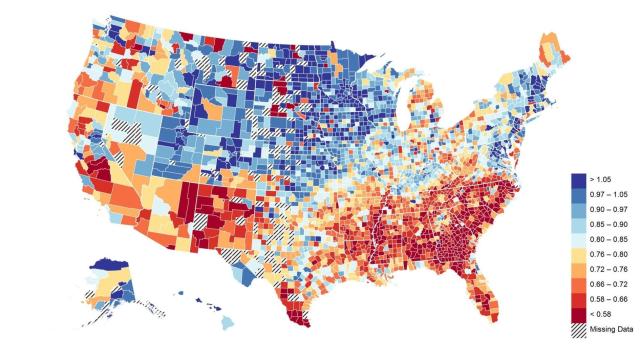New research measuring over 21 billion Facebook friendships seemingly confirms something you probably already inherently knew: having rich friends helps.
Researchers at Harvard’s Opportunity Insights used a massive Facebook dataset based on over 72 million users to analyse the ways certain types of social conditions impact economic mobility in a pair of papers published in Nature on Monday. The first paper focused in on “economic connectedness” a term researchers use to describe the level of close friendships between users of lower and higher income levels. According to the research, lower-income children were more likely to experience economic gains as adults if they had close connections to high-income individuals. The second paper meanwhile dug into more specific examples of how those cross-class interactions play out in the real world.
On average, the research claims low-income children saw an 8.2% increase in their adulthood incomes when their share of higher-income friends increased from 25-50%. Low-income individuals with higher shares of richer friends also generally saw improved high school completion rates and lower teenage birth rates. Researchers said high economic connectedness, “is among the strongest predictors of upward income mobility identified to date.”
Cross-class friendships reportedly had a bigger impact on economic outcomes than family structure, school quality, job availability, and the racial makeup of a community. The findings weren’t limited to rich neighbourhoods either. The researchers found children in both poor and rich neighbourhoods still did better relatively based on their level of economic connectedness. In other words, just putting children of varying economic backgrounds together may not be enough on its own to lead to better outcomes. Instead, according to the researchers, people interested in increased economic connectedness need to focus on actually getting those groups to interact with one another. They should be real friends.
Who was measured in these studies anyway?
The study drew on Facebook friendships data from 72.2 million users, which the researchers estimate accounts for roughly 84% of U.S. adults between the ages of 25-44. The data did not include names and was reportedly limited to active Facebook users who have at least 100 friends and were active at least once on the platform in the previous 30 days. Researchers estimated these users’ incomes based on their ZIP codes, colleges, phone models and other characteristics sucked up by Facebook. Neighbourhood incomes, by contrast, were reportedly compared using previously reported tax records. The results found neighbourhoods with higher cross-class connections have higher incomes.
In addition to revealing fluctuations in economic attainment, the studies also provided interesting details on differences in how certain groups tend to make friends. Poorer children, in general, were far more likely to make friends within their neighbourhood than high-income people. Higher-income individuals, on the other hand, were more likely to meet their friends in college. These findings play themselves out, in reality, every year as upper middle class and wealthy youths continue to fill college classes.
In education, larger more diverse schools tended to experience less cross-class interactions. Similarly, neighbourhoods with more racial diversity also tended to have less cross-class interaction, suggesting racial divisions could be making it even more difficult to cross class divides. It’s worth noting here that the raw data itself reportedly does not include the racial characteristics of users.
The researchers released a series of interactive maps illustrating zip codes where these cross-class interactions occurred…or didn’t. The lowest levels of economic connectedness generally appeared clustered in the Southeast, Southwest, and industrial cities in the midwest while the zip codes with the highest interactions tended to form around the Northeast coast and the rural Midwest.
Meta’s selective research partnerships
Unsurprisingly Meta, Facebook’s parent company, was more than happy to take credit for facilitating the findings. In a blog post, Meta’s President of Global Affairs Nick Clegg said the study was an example of how Meta’s vast troves of personal data, “can be used for significant societal research when shared responsibly.” Clegg said Meta would make the data used in the studies public through its Data for Good platform.
“This work is a major contribution to our understanding of the relationship between social connections and economic opportunity,” Clegg wrote. “And it shows how Meta’s data can be used for societally significant research when shared responsibly and in a way that protects people’s privacy.”
Meta has a mixed history when it comes to sharing data with researchers. While the company has shown a willingness to work with academics digging into generalized insights around users on a macro level, the company has stiffened at applying that same level of access to researchers investigating user behaviour that could implicate the company’s business model. Last year, for instance, the company came under fire from researchers and transparency advocates after it blocked a team of New York University researchers studying the impact of political ads and COVID-19 misinformation from accessing the site. Months later critics claimed changes made to Facebook’s New Feed, ostensibly aimed at targeting ad blockers, actually limited independent researchers’ access to the platform even further.
The positive applications of Facebook’s data come at a much-needed time for the company which just reported its first-ever quarterly revenue decline in the company’s 18-year history and as it feigns off criticism for yet another human rights controversy. Last week Kenya’s national cohesion watchdog threatened to suspend Facebook from the country for failing to remove ads allegedly advocating for ethnic cleansing. Prior to that, Meta faced intense criticism from rights groups spanning multiple countries who derided the company’s first Human Rights Assessment as a piece of “corporate propaganda.”
